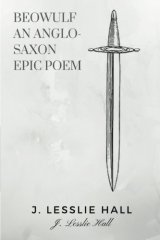Beowulf Page #10
Beowulf is an Old English epic poem consisting of 3,182 alliterative lines. It is one of the most important works of Old English literature. The date of composition is a matter of contention among scholars; the only certain dating pertains to the manuscript, which was produced between 975 and 1025.
{'Twas mere folly that actuated you both to risk your lives on the ocean.} From vainest vaunting adventured your bodies In care of the waters? And no one was able Nor lief nor loth one, in the least to dissuade you Your difficult voyage; then ye ventured a-swimming, 15 Where your arms outstretching the streams ye did cover, The mere-ways measured, mixing and stirring them, Glided the ocean; angry the waves were, With the weltering of winter. In the water's possession, Ye toiled for a seven-night; he at swimming outdid thee, 20 In strength excelled thee. Then early at morning On the Heathoremes' shore the holm-currents tossed him, Sought he thenceward the home of his fathers, Beloved of his liegemen, the land of the Brondings, The peace-castle pleasant, where a people he wielded, [20] 25 Had borough and jewels. The pledge that he made thee {Breca outdid you entirely.} The son of Beanstan hath soothly accomplished. Then I ween thou wilt find thee less fortunate issue, {Much more will Grendel outdo you, if you vie with him in prowess.} Though ever triumphant in onset of battle, A grim grappling, if Grendel thou darest 30 For the space of a night near-by to wait for!" {Beowulf retaliates.} Beowulf answered, offspring of Ecgtheow: "My good friend Unferth, sure freely and wildly, {O friend Unferth, you are fuddled with beer, and cannot talk coherently.} Thou fuddled with beer of Breca hast spoken, Hast told of his journey! A fact I allege it, 35 That greater strength in the waters I had then, Ills in the ocean, than any man else had. We made agreement as the merest of striplings Promised each other (both of us then were {We simply kept an engagement made in early life.} Younkers in years) that we yet would adventure 40 Out on the ocean; it all we accomplished. While swimming the sea-floods, sword-blade unscabbarded Boldly we brandished, our bodies expected To shield from the sharks. He sure was unable {He could not excel me, and I would not excel him.} To swim on the waters further than I could, 45 More swift on the waves, nor would I from him go. Then we two companions stayed in the ocean {After five days the currents separated us.} Five nights together, till the currents did part us, The weltering waters, weathers the bleakest, And nethermost night, and the north-wind whistled 50 Fierce in our faces; fell were the billows. The mere fishes' mood was mightily ruffled: And there against foemen my firm-knotted corslet, Hand-jointed, hardy, help did afford me; My battle-sark braided, brilliantly gilded, {A horrible sea-beast attacked me, but I slew him.} 55 Lay on my bosom. To the bottom then dragged me, A hateful fiend-scather, seized me and held me, Grim in his grapple: 'twas granted me, nathless, To pierce the monster with the point of my weapon, My obedient blade; battle offcarried 60 The mighty mere-creature by means of my hand-blow. [1] It has been plausibly suggested that 'síð' (in 501 and in 353) means 'arrival.' If so, translate the bracket: (the arrival of Beowulf, the brave seafarer, was a source of great chagrin to Unferth, etc.). [21] X. BEOWULF SILENCES UNFERTH.--GLEE IS HIGH. "So ill-meaning enemies often did cause me Sorrow the sorest. I served them, in quittance, {My dear sword always served me faithfully.} With my dear-lovèd sword, as in sooth it was fitting; They missed the pleasure of feasting abundantly, 5 Ill-doers evil, of eating my body, Of surrounding the banquet deep in the ocean; But wounded with edges early at morning They were stretched a-high on the strand of the ocean, {I put a stop to the outrages of the sea-monsters.} Put to sleep with the sword, that sea-going travelers 10 No longer thereafter were hindered from sailing The foam-dashing currents. Came a light from the east, God's beautiful beacon; the billows subsided, That well I could see the nesses projecting, {Fortune helps the brave earl.} The blustering crags. Weird often saveth 15 The undoomed hero if doughty his valor! But me did it fortune[1] to fell with my weapon Nine of the nickers. Of night-struggle harder 'Neath dome of the heaven heard I but rarely, Nor of wight more woful in the waves of the ocean; 20 Yet I 'scaped with my life the grip of the monsters, {After that escape I drifted to Finland.} Weary from travel. Then the waters bare me To the land of the Finns, the flood with the current, {I have never heard of your doing any such bold deeds.} The weltering waves. Not a word hath been told me Of deeds so daring done by thee, Unferth, 25 And of sword-terror none; never hath Breca At the play of the battle, nor either of you two, Feat so fearless performèd with weapons Glinting and gleaming . . . . . . . . . . . . [22] . . . . . . . . . . . . I utter no boasting; {You are a slayer of brothers, and will suffer damnation, wise as you may be.} 30 Though with cold-blooded cruelty thou killedst thy brothers, Thy nearest of kin; thou needs must in hell get Direful damnation, though doughty thy wisdom. I tell thee in earnest, offspring of Ecglaf, Never had Grendel such numberless horrors, 35 The direful demon, done to thy liegelord, Harrying in Heorot, if thy heart were as sturdy, {Had your acts been as brave as your words, Grendel had not ravaged your land so long.} Thy mood as ferocious as thou dost describe them. He hath found out fully that the fierce-burning hatred, The edge-battle eager, of all of your kindred, 40 Of the Victory-Scyldings, need little dismay him: Oaths he exacteth, not any he spares {The monster is not afraid of the Danes,} Of the folk of the Danemen, but fighteth with pleasure, Killeth and feasteth, no contest expecteth {but he will soon learn to dread the Geats.} From Spear-Danish people. But the prowess and valor 45 Of the earls of the Geatmen early shall venture To give him a grapple. He shall go who is able Bravely to banquet, when the bright-light of morning {On the second day, any warrior may go unmolested to the mead-banquet.} Which the second day bringeth, the sun in its ether-robes, O'er children of men shines from the southward!" 50 Then the gray-haired, war-famed giver of treasure {Hrothgar's spirits are revived.} Was blithesome and joyous, the Bright-Danish ruler Expected assistance; the people's protector {The old king trusts Beowulf. The heroes are joyful.} Heard from Beowulf his bold resolution. There was laughter of heroes; loud was the clatter, 55 The words were winsome. Wealhtheow advanced then, {Queen Wealhtheow plays the hostess.} Consort of Hrothgar, of courtesy mindful, Gold-decked saluted the men in the building, And the freeborn woman the beaker presented {She offers the cup to her husband first.} To the lord of the kingdom, first of the East-Danes, 60 Bade him be blithesome when beer was a-flowing, Lief to his liegemen; he lustily tasted Of banquet and beaker, battle-famed ruler. The Helmingish lady then graciously circled 'Mid all the liegemen lesser and greater:
Translation
Translate and read this book in other languages:
Select another language:
- - Select -
- 简体中文 (Chinese - Simplified)
- 繁體中文 (Chinese - Traditional)
- Español (Spanish)
- Esperanto (Esperanto)
- 日本語 (Japanese)
- Português (Portuguese)
- Deutsch (German)
- العربية (Arabic)
- Français (French)
- Русский (Russian)
- ಕನ್ನಡ (Kannada)
- 한국어 (Korean)
- עברית (Hebrew)
- Gaeilge (Irish)
- Українська (Ukrainian)
- اردو (Urdu)
- Magyar (Hungarian)
- मानक हिन्दी (Hindi)
- Indonesia (Indonesian)
- Italiano (Italian)
- தமிழ் (Tamil)
- Türkçe (Turkish)
- తెలుగు (Telugu)
- ภาษาไทย (Thai)
- Tiếng Việt (Vietnamese)
- Čeština (Czech)
- Polski (Polish)
- Bahasa Indonesia (Indonesian)
- Românește (Romanian)
- Nederlands (Dutch)
- Ελληνικά (Greek)
- Latinum (Latin)
- Svenska (Swedish)
- Dansk (Danish)
- Suomi (Finnish)
- فارسی (Persian)
- ייִדיש (Yiddish)
- հայերեն (Armenian)
- Norsk (Norwegian)
- English (English)
Citation
Use the citation below to add this book to your bibliography:
Style:MLAChicagoAPA
"Beowulf Books." Literature.com. STANDS4 LLC, 2025. Web. 10 Mar. 2025. <https://www.literature.com/book/beowulf_945>.








Discuss this Beowulf book with the community:
Report Comment
We're doing our best to make sure our content is useful, accurate and safe.
If by any chance you spot an inappropriate comment while navigating through our website please use this form to let us know, and we'll take care of it shortly.
Attachment
You need to be logged in to favorite.
Log In